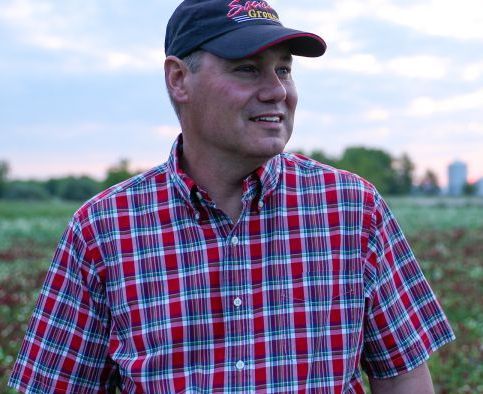

Rick Clark
Fifth Generation farmer in Warren County, Indiana
Rick Clark is a 5th generation farmer from Williamsport, IN. The main goal on the farm is to build soil health and achieve balance with Mother Nature. Rick has developed and constantly improving a systematic approach to regenerative farming. The farm strives to be a low cost input producer, while maintaining an increase in yield year over year. The farm is 100% NGMO, 100% no till, and 100% cover crop. Rick is currently transitioning the 7000 acre farm to organic. He is most proud of developing a system of organic farming that uses no tillage. He will suppress weeds with cover crops. Rick cares deeply about human health as well, that is one of the main drivers behind the organic no till style of farming. Rick is building a system that will be viable and sustainable for generations to come.
2021 presentation:
Leading with Soil Health
SUMMARY: A few years ago, Rick describes, the farm went through a major rain event. “We had a one-inch rain event on the farm right after we had freshly tilled some soil,” recalls Rick. “I could not believe how far that soil had moved in the ditch and was ready to leave the farm. That was enough.” What started as a desire to solve for discrete challenges on the farm—increasing soil resiliency in response to an eroding rain event—has transformed into a systematic dedication to building soil health across the operation. Farming Green, as Rick calls it, now encompasses a suite of conservation practices including planting cash crops directly into cover crops, no-till practices, rotational grazing livestock, and reducing inputs and energy use on the operation. CCA CEU Approved: 1 Crop Management

Kris Nichols
Soil Microbiologist – KRIS Systems Education & Consultation
Dr. Kris Nichols is a leader in the movement to regenerate soils for healthy crops, food, people, and the planet. She is the research director at MyLand Company LLC in Phoenix, Arizona. She is also the founder and principal scientist of Knowledge for Regeneration and Innovation in Soils Systems Education & Consultation; soil microbiology research advisor with the Food Water Wellness Foundation in Olds, Alberta; research director with Carbon Sync in Freemantle, Western Australia; and research advisor with Canadian Organic Growers. Kris received bachelor’s degrees in plant biology and in genetics and cell biology from the University of Minnesota in 1995, a master’s in environmental microbiology from West Virginia University in 1999, and a doctorate in soil science from the University of Maryland in 2003. In recognition of her work, Kris has received several awards including the 2012 Conservation Research Award from the International Soil and Water Conservation Society.
2021 presentation:
Regeneration Principles and Toolbox
SUMMARY: “The six integrated regeneration principles will be described with a focus on their integration to solve the lack of soil carbon problem. The six principles are 1. Green and growing; 2. Utilizing diversity; 3. Reducing synthetic inputs; 4. Managing livestock; 5. Maintaining soil armor; and 6. Decreasing soil disturbance. Although each principle will be outlined individually, their interrelationships will be of primary focus particularly as it relates to carbon flow.
A toolbox for producers to test and monitor soil health and carbon regeneration will be described including tools for measuring soil aggregate stability and mycorrhizal colonization. Information will be provided on building and using tools to assess and monitor both qualitatively and quantitatively.”
CCA CEU Approved: 1 Crop Management

Jimmy Emmons
Regional Coordinator for the Southern Plains Region – FPAC (Oklahoma) – Third Generation Farmer/Rancher
Jimmy and his family own and manage 2,000 cropland acres and 5,000 rangeland acres in Dewey County, Oklahoma. The farm was converted to no-till in 1995, and Jimmy later went a few steps further and adopted crop rotations, cover crops, and planned grazing management to Jimmy uses specialized soil and plant tissue testing to monitor soil fertility. This helps him adjust fertilizer application rates by crediting the system for nutrients supplied by soil organic matter. In 2017, Jimmy’s farm received the inaugural Oklahoma Leopold Conservation Award. The Leopold Conservation Award recognizes extraordinary achievement in voluntary stewardship and management of natural resources. Jimmy serves as president of the Oklahoma Association of Conservation Districts and is on the board of the Dewey County Conservation District. As FPAC regional coordinator for the southern plains region, he serves Oklahoma, Texas, New Mexico, Colorado and Kansas.
2021 presentation:
State of the State of Soil
SUMMARY: Emmons will give us the “State of the State of Soil” from the eyes of an Oklahoma Soil Health Steward as well as his work with USDA. Jimmy will review Farm Production and Conservation (FPAC) programming including how they implement programs designed to mitigate the significant risks of farming through crop insurance services, conservation programs, and technical assistance, and commodity, lending, and disaster programs. In addition, Emmons will present a historical review of soil health as it relates to civilization taking listeners on a journey up to the present-day status of soil health in the United States. Emmons family conducts several pilot programs and on-farm studies which he will review with the audience. He has several diverse crops: wheat, irrigated dairy alfalfa hay, wheat-canola rotation, and a cow-calf operation. He will review the incorporation of cover crops and livestock to improve soil health along with soil tests to show progress along with data from soil moisture probe experiments. He is also looking at cover crops as a forage source for cattle and what might be done to heal native grass pastures with cover crops. CCA CEU Approved: 1 Crop Management